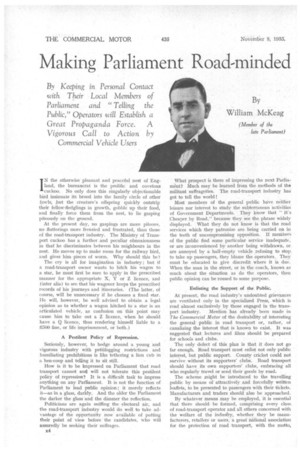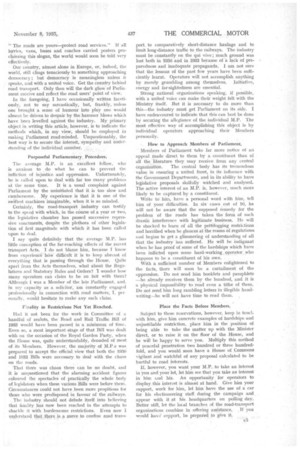Making Parliament Road-minded
Page 126

Page 127

If you've noticed an error in this article please click here to report it so we can fix it.
By Keeping in Personal Contact with Their Local Members of Parliament and "Telling the Public," Operators will Establish a Great Propaganda Force. A Vigorous Call to Action by Commercial Vehicle Users . By
William. McKe.ag IN the otherwise pleasant and peaceful nest of England, the bureaucrat is the prolific and covetous cuckoo. No only does this singularly objectionable bird insinuate its brood into the family circle of other fowlg, 1:111t the creature's offspring quickly outstrip their fellow-fledglings in growth, gobble up their food, and finally force them from the nest, to lie gasping piteously on the ground.
At the present day, no gaspings are more piteous, no flutterings more frenzied and frustrated, than those of the road-transport industry. The Ministry of Transport cuckoo has a further and peculiar obnoxiousness in that he discriminates between his neighbours in the nest. He moves up to make room for the railway bird, and gives• him pieces of worm. Why should this be?
The cry is all for imagination in industry; but if a road-transport owner wants to hitch his wagon to a star, he must first be sure to apply in the prescribed manner for the appropriate X, Y or Z licence, and (inter alia) to see that his wagoner keeps the prescribed records of his journeys and itineraries. (The latter, of course, will be unnecessary if he chooses a fixed star. He will, however, be well advised to obtain a legal opinion as to whether a wagon hitched to a star is an articulated vehicle, as confusion on this point may cause him to take out a Z licence, when he should have a Q licence, thus rendering himself liable to a :£500 fine, or life imprisonment, or both.) A Pestilent Policy of Repression.
Seriously, however, to hedge around a young and vigorous industry with pettifogging restrictions and humiliating prohibitions is like tethering a lion cub in a hen-coop and telling it to sit still.
How is it to be impressed on Parliament that road transport cannot and will not tolerate this pestilent policy of repression? It is a difficult task to impress anything on any Parliament. It is not the function of Parliament to lead public opinion ; it merely reflects it—as in a glass, darkly. And the older the Parliament the darker the glass and the dimmer the reflection.
Politicians are again sniffing the electoral air, and the road-transport industry would do well to take advantage of the opportunity now available of putting their point of vie* before the candidates, who will assuredly be seeking their suffrages.
E4 What prospect is there of impressing the next Parliament? Much may be learned from the methods of the militant suffragettes. The road-transport industry has got to tell the world / Most members of the general public have neither leisure nor interest to study the subterranean activities of Government Departments. They know that " It's Cheaper by Road," because they see the phrase widely displayed. What they do not know is that the road services which they patronize are being carried on in the teeth of uncompromising opposition. If members of the public find some particular service inadequate, or are inconvenienced by another being withdrawn, or are annoyed by a half-empty vehicle refusing to stop to take up passengers, they blame the operators. They must be educated to give discredit where it is due. When the man in the street, or in the coach, knows as much about the situation as do the operators, then public opinion can be roused to some purpose.
Enlisting the Support of the Public.
At present, the road industry's undoubted grievances are ventilated only in the specialized Press, which is read almost exclusively by those engaged in the trans port industry. Mention has already been made in The Commercial Motor of the desirability of interesting the general public in road transport or, rather, of canalizing the interest that is known to exist. It was suggested that lectures and films should be prepared for schools and clubs.
The only defect of this plan is that it does not go far enough. Road transport must enlist not only public interest, but public support. County cricket could not survive without its supporters' clubs. Road transport should have its own supporters' clubs, embracing all who regularly travel or send their goods by road.
The scheme might be introduced to the travelling public by means of attractively and forcefully written leaflets, to be presented to passengers with their tickets. Manufacturers and traders should also be approached.
By whatever means may be employed, it is essential that there should be formed, comprising every class. of road-transport operator and all others concerned with the welfare of the industry, whether they be manufacturers, retailers or users, a great national association for the protection of road transport, with the motto, The roads are yours—protect road services." If all lorries, vans, buses and coaches carried posters proclaiming this slogan, the world would soon be told very effectively.
Our country, almost alone in Europe, or, indeed, the world, still clings tenaciously to something approaching democracy; but democracy is meaningless unless it speaks, and with a united voice. Get the country behind road transport. Only then will the dark glass-of Parliament receive and reflect the road users' point of view.
In the foregoing. I have occasionally written facetiously, not to say sarcastically, but, frankly, unless one brought a sense of humour into play one would almost be driven to despair by the hammer blows which have been levelled against the industry. My primary object in writing this article, however, is to indicate the methods which, in my view, should be employed in making Parliament road-minded. Unquestionably, the best way is to secure the interest, sympathy and Understanding of the individual member.
Purposeful Parliamentary. Procedure: The average M.P. is an excellent fellow, who is anxious to . do what he can to prevent the infliction of injustice and oppression. Unfortunately, he is called upon to deal with far too many problems
at the same time. It is a usual complaint against Parliament by the uninitiated that it is too slow and cumbersome. My experience is that it is one of the swiftest machines imaginable; when it is so minded.
Certainly, the road-transport industry can testify to the speed with which, in the course of a year or two, the legislative chamber has passed successive repressive enactments, despite the plethora of other legislation of first magnitude with which it has been called upon to deal.
I say quite definitely that the average M.P. has little conception of the far-reaching effects of the recent transport Acts. I do not blame him, because I know from experiente'hOWdifficult it is to keep abreast of everything that is passing through the House. Quite apart from the Acts themselves, what about the Regulations and Statutory Rules and Orders? I wonder how many operators can claim to be au fait with them? Although I was a Member of the late Parliament, and, in my capacity as a solicitor, am Constantly engaged professionally in connection with road matters, I, personally, would hesitate to make any such claim.
Finality in Restrictions Not Yet Reached.
Had it not been for the work in Committee of a handful of zealots, the Road and Rail Traffic Bill of 1933 would have been passed in a minimum of time. Even so, a most important -stage of that Bill was dealt with on the occasion of the Royal Garden Party, when the House was, quite understandably, denuded of most of its Members. However, the majority of M.P.s was prepared to accept the official view that both the 1930 and 1933 Bills were necessary to deal with the chaos on the roads.
That there was chaos there can be no doubt, and it is unquestioned that the alarming accident figures coloured the spectacles of practically the whole body of legislator's when these various Bills were before them. Circumstances could not have been more propitious for those who were predisposed in favour of the railways.
The industry, should not delude itself into believing that finality has now been reached in the attempts to shackle it with burdensome restrictions. Even now I iniderstand that.there is a move to confine road trans
port, to comparatively short-distance haulage and to limit long-distance traffic to the railways. The industry must be constantly on the qui vive ; much ground was lost both in 1930 and in 1933 because of lack of preparedness and inadequate propaganda. I am not sure that the lessons of the past few years have been sufficiently learnt. Operators will not accomplish anything by merely grumbling among themselves. Initiative, energy and far-sightedness are essential.
Strong national organizations speaking, if possible, with a united voice can make their weight felt with the Ministry itself. But it is necessary to do more than this—the industry must get Parliament on its side. I have endeavoured to indicate that this can best be done by securing the allegiance of the individual M.P. The most effective way of accomplishing this object is by individual operators approaching their Members personally.
How to Approach Members of Parliament. Members of Parliament take far more notice of an appeal made direct to them by a constituent than of all the literature they may receive from any central organization. The central body has its tremendous value in ensuring a united front, in its influence with the Government Departments, and in its ability to have legislative proposals skilfully watched and analysed. The active interest of an M.P. is, however, much more likely to be captured by a constituent.
Write to' him, have a personal word with him, tell him of your difficulties. In six cases out of 10, he will not be aware that the supposed remedy for the problem of -the roads has taken the form of such drastic interference with legitimate business. He will be shocked to learn of all the pettifogging restrictions and horrified when he glances at the reams of regulations and begins to get a glimmering of understanding of all that the industry has suffered. He will be indignant when he has proof of some of the hardships which have been inflicted upon some hard-working . operator who happens to be a constituent of his own.
With a sufficient number of Members enlightened to the facts, there will soon be a curtailment of the oppression. Do not send him booklets and pamphlets —he already receives them by the hundred, and it is a physical impossibility to 'read even a tithe of them. Do not send him long rambling letters in illegible handwriting—he will not have time to read them.
Place the Facts Before Members.
Subject to these reservations, however, keep in touch with him, give him concrete examples of hardships and unjustifiable restriction, place him in the position of being able to take the matter up with the Minister direct, or to, raise it on the floor of the House, and he will be happy to serve you. Multiply this method of peaceful penetration two hundred or three hundredfold, and you would soon have a House of Commons vigilant and watchful of any proposal calculated to be hurtful to road interests.
If, however, you want your M.P. .to take an interest in you and your lot, let him see that you take an interest in him and his. An opportunity for operators to display,this interest is almost at hand. Give him your support, work for him, let him have the use of a car for his electioneering staff. (luting the campaign and appear with it at his headquarters on polling day. Better still, let the local branches of the road-transport organizations combine in offering assistance. , If you would have'' support, be prepared to give it.












































































































































































































































































































